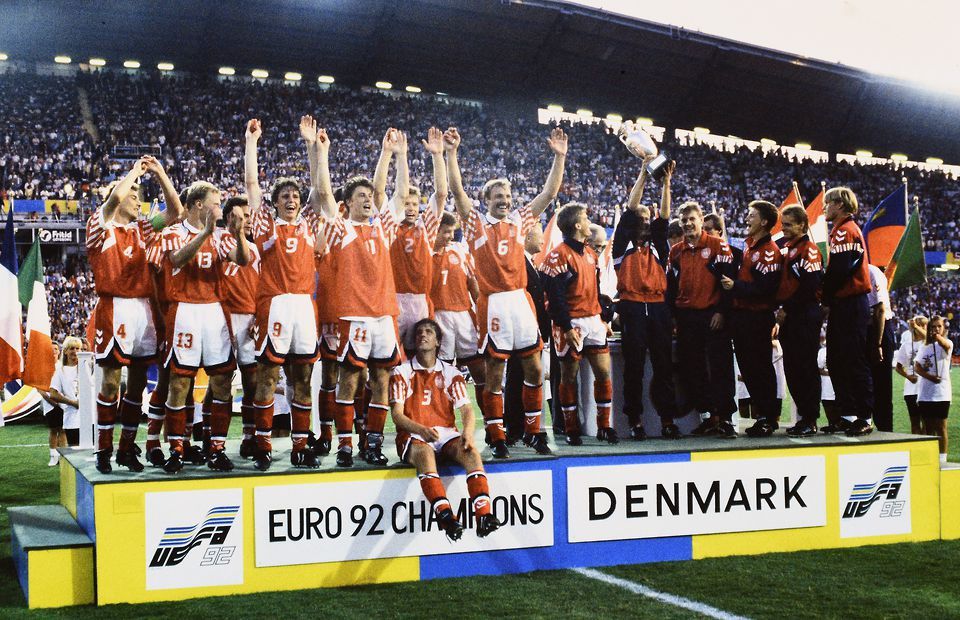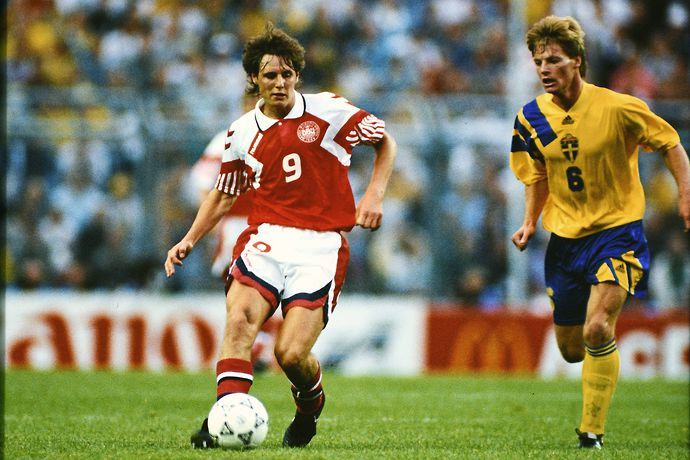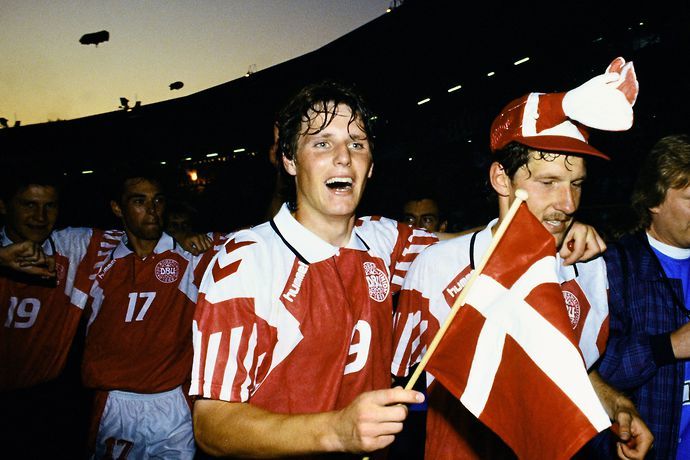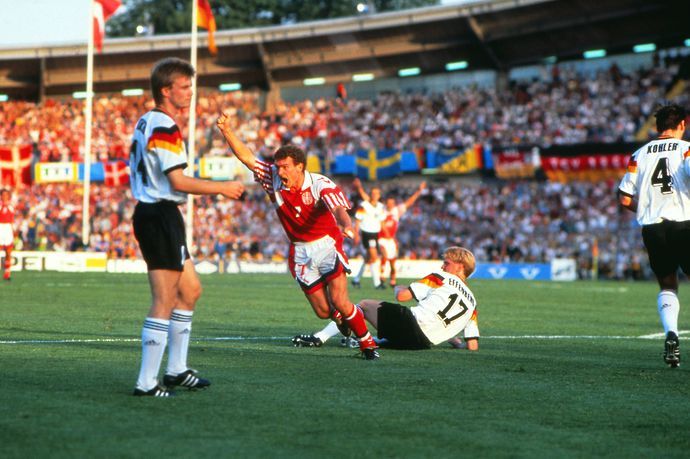Denmark’s victory at Euro '92 remains one of the most celebrated underdog stories of all time.
No country as small has won the tournament before or since, while their selection for the tournament following the expulsion of the crumbling Yugoslavia 10 days before its start makes it all the more remarkable.
Kim Vilfort, a midfielder who scored the second goal that sealed their win against Germany in the final, says that “on the calibre of our players alone, we shouldn’t have won”. They had to do it without their biggest icon, Michael Laudrup, who had fallen out with their manager.
Contrary to what some believe, few, if any, of the squad were on holiday when the news broke that Yugoslavia were out of the finals and Denmark were in on 30 May 1992. Some 13 of the 20-man squad played in the Danish Superliga, which had two rounds of fixtures remaining. Vilfort was one of three Brøndby players who faced BK Frem three days before the Euro '92 tie with England across the water from Copenhagen in Malmö.
Goalkeeper Peter Schmeichel and striker Bent Christensen had also been in a strong Brøndby team narrowly defeated by Roma in the semi-final of the UEFA Cup a year previously. The Danish national team may not have stood out before the tournament but Vilfort says “we still had a lot of very talented players.”
Denmark indeed proved competitive in a drab 0-0 draw with England and 1-0 defeat to Sweden. With only the top two progressing from their group though, their campaign was written off, not for the first time. Danish TV commentators signed off from the Sweden match incorrectly saying Denmark were already out of the competition, perhaps not realising that with all the other matches so far in the group drawn, a win in the final group stage match against France could still send them through.
Denmark’s qualifying campaign had looked doomed 18 months previously after they were held away at Northern Ireland, lost at home to Yugoslavia and had the Laudrup brothers walk out of the national set-up after three matches. They were, of course, unable to catch Yugoslavia for the sole qualifying spot in the group, but Vilfort says some excellent performances in qualifying inspired confidence.
At the finals in 1992, a shock 2-1 win in the last group match against a French team featuring Papin, Cantona and Deschamps sent the Danes through to the last four as Sweden had beaten England. Vilfort missed the France game to return to Denmark to attend to his seriously ill daughter but returned to the camp with the mood lifted to another level.
Denmark clearly had their manager Richard Møller Nielsen to thank for squeezing through the group. Vilfort doesn’t recall Nielsen vowing before the tournament that Denmark could win it as some other players have, but knew him as a very ambitious and dedicated coach. “He really got the very best out of our team,” he said.
Suitably for the underdog story, only a slice of great fortune gave Nielsen the Denmark job in the first place in 1990. German Horst Wohlers was presented as the new manager at a Danish Football Association press conference without it being realised he was unable to walk away from his contract with Bayer Uerdingen.
Nielsen had been Denmark’s U21 manager for over a decade and was seen as a safe pair of hands to turn to. His brand of football wasn’t deemed exciting, and alienated the Laudrup brothers, but having previously worked with so many players in the U21s, he knew exactly what made them tick.
Nielsen’s attention to detail was extraordinary. He was a data-led coach in an analogue age, keeping reams of notes compiled on every match he had ever watched and using video analysis. “When it came to the opponents, he knew so much about every player,” Vilfort recalled.
Nielsen demanded hard work but was also humble enough to tailor his approach to help nurture a remarkable team spirit. Nielsen decided to cancel a training session after the semi-final and take the team to play mini-golf instead. On another occasion, the entire squad stopped at a Swedish McDonald’s for burgers.
Nielsen told the BBC’s Ray Stubbs before Denmark’s semi-final against the Netherlands: “I cannot promise we will win. I can promise you one thing though – every player on the Danish team will do their best.” Vilfort says the thrilling 2-2 draw was “one of the best international matches I ever took part in.”
Peter Schmeichel emerged as a hero by saving Marco Van Basten’s penalty in the shoot-out. Vilfort said: “He was a world-class goalkeeper who had a fantastic tournament.”
As a striker earlier in his career and an occasional penalty taker for Brøndby, Vilfort had no hesitation stepping up to take Denmark’s penultimate penalty, and scoring: “I felt confident about taking it and thought I, therefore, had to take on the responsibility.”
“We went into the final feeling like we had nothing to lose at all,” Vilfort admitted. John Jensen, the butt of jokes in the Denmark camp for his poor shooting, smashed in a volley in the 18th minute. Then with 12 minutes remaining, the ball bounced towards Vilfort on the edge of the German penalty area. He chested it down, twisted inside past Thomas Helmer and rifled it into the bottom corner.
“I just relied on my instinct from my years as a striker. I realised I was close to the goal and could shoot on my left foot.”
Vilfort fondly remembers crossing back to Denmark for the first time as champions, having been a little removed from the extent of the football fever erupting back home.
He recalled: “There was just a great sense of unity of everyone from all ages and backgrounds being happy. The sun was shining and it just fantastic to be part of it, as the atmosphere there was better even than when we won the final."























